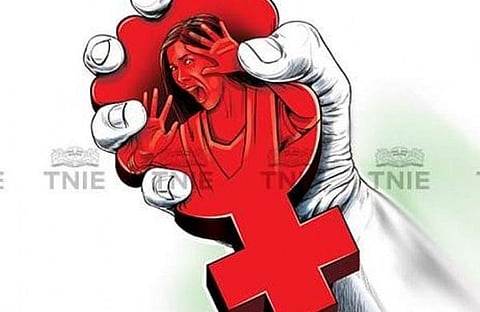Re-looking at earlier stand on criminalisation of marital rape, Centre tells Delhi HC
NEW DELHI: The Centre Tuesday told the Delhi High Court that it is re-looking at its earlier stand on petitions seeking criminalisation of marital rape as that was brought on record in affidavit filed several years ago.
Justice Rajiv Shakdher, who is heading the bench hearing a batch of petitions to strike down the exemption from prosecution for the offence of rape granted to husbands under the Indian Penal Code, said the central government needs to make up its mind with respect to its position on the issue.
The learned solicitor (general) had said that we will be re-looking at the affidavit. These are affidavits quite back in point in time in 2015-2017, Additional Solicitor General (ASG) Chetan Sharma, appearing for the Centre, told the bench also comprising Justice C Hari Shankar.
Justice Shakdher stated that there were only two ways of dealing with the issue of criminalisation of marital rape -- either by a court decision or a decision taken by the legislature -- and if the Centre does not clarify its stand, the court would go ahead with the affidavit already on record.
There are only two ways of closing this issue. One is the legislative route, other is a court decision. There is no third way of closing this issue. You people need to make up your mind whether you need to stick to the position that you have taken in the counter (affidavit) or you will change it.
If you want to change it, you must let us know, he said.
There is a position on record. You deal with it and if they change it they will come back and tell us, Justice Shakdher told the counsel for the petitioner.
ASG Sharma requested the court to allow the Centre to make submissions on the petitions next week.
Last week, the court had asked the Centre to inform whether it wished to withdraw its earlier affidavit filed in the matter in view of its latest stand that it was undertaking a consultative process on the issue.
In its 2017 affidavit, the Centre had submitted that marital rape cannot be made a criminal offence as it could become a phenomenon that may destabilise the institution of marriage and an easy tool for harassing husbands.
However, on January 13, Solicitor General Tushar Mehta told the high court that the Centre was considering a constructive approach to the issue and has sought suggestions from several stakeholders and authorities on comprehensive amendments to the criminal law.
Mehta had also stated it would not be appropriate to place before the court a less discussed and consulted stand and time was needed to undertake the process of consultation.
On January 24, he had said criminalisation of marital rape involved family issues as well as the dignity of a woman and cannot be looked at from a microscopic angle and sought some time to respond with the government's stand.
The petitioners have challenged the Constitutionality of the marital rape exception under Section 375 IPC (rape) on the ground that it discriminated against married women who are sexually assaulted by their husbands.

